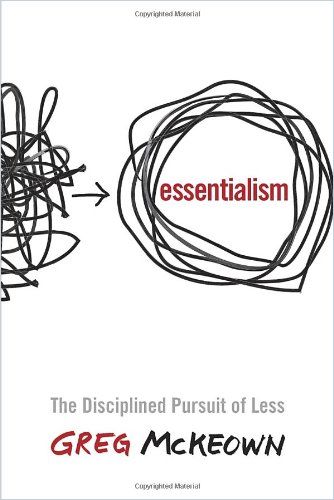Co-author of Multipliers, Greg McKeown offers a detailed, workable method for paring your life to its essentials.

Do Better with Less
In this New York Times million-copies bestseller, Greg McKeown makes an enthusiastic, credible case for paring down. He advocates trimming your life processes – especially those in your work life – to the bare necessities. He urges rejecting reactive decisions in favor of mindful choices, doing only what you choose to do, cutting noise out of your life and accepting trade-offs. McKeown writes like the high-level blogger he is and presents complete ideas quickly and clearly. He provides an excellent starting point for living and working more efficiently.
Forbes found that McKeown “puts you in real control, giving greater precision to the pursuit of what truly matters.” And Success found him “likeable and astute.”
Pare Down
Begin, McKeown dictates, by deciding what problems you must solve. The classic Zen underlying his approach manifests in his refrain, “There is only now.” He believes that buying into the myth that you can have it all can be destructive. Performing more, less-meaningful work or even more, less-meaningful play intensifies stress, he says, and makes you less satisfied with your accomplishments. McKeown preaches paring your life to the essentials.
When individuals are involved in too many disparate activities – even good activities – they can fail to achieve their essential missions.Greg McKeown
Many best-selling books tell you how to reduce clutter on your bookshelves, in your kitchen and especially in your clothes closet. McKeown explains how to apply similar principles to reduce clutter in your life. Identify activities that fulfill your priorities, then, he recommends, get rid of the rest. This requires clear tasks and methods. Because reducing life to its essentials goes against most people’s nature, he admits you must make a dedicated, concerted, conscious effort.
Pay Heed to Three Areas
Essentialists, according to McKeown, vest in three crucial aspects of life. The first element is personal choice. Only you can and should choose how you will spend your “energy and time.” Making the correct, positive choice is always the Essentialist goal. The second aspect is controlling noise. “Anything that doesn’t further your goals is little more than noise.” Essentialists cut through the noise and devote themselves to what matters. The third aspect is that Essentialists accept trade-offs; you can’t do or have everything. They consider and then pursue only the few, most meaningful issues they want to resolve.
Consider consistently profitable Southwest Airlines as an exemplar of positive trade-offs. Herb Kelleher, Southwest’s leader, makes conscious trade-offs: Southwest flies only directly from one city to another. To avoid increasing ticket prices to cover onboard food, Southwest does not serve meals. It offers one class of ticket: economy. If these choices drive passengers to other carriers, Kelleher doesn’t mind. He set out to run a bargain airline and never intended Southwest to be all things to all customers. He made tough choices that led to and sustain success.
The way of the Essentialist means living by design, not by default.Greg McKeown
McKeown follows his “90 Percent Rule”: Things are top-level or nothing. When picking among choices, he explains, identify your paramount criteria and score your options between zero and 100. Discard any that score lower than 90.
To apply the 90% method, you must understand trade-offs. Be ruthless and reject viable, but mediocre, alternatives. He emphasizes that rejecting a near-perfect choice means you believe a nearer-to-perfect option will appear; this empowers you because you choose on purpose, not “by default.”
Using the 90% rule will teach you that if you lack high standards, multiple choices will overwhelm you. Tough criteria obviate indecision, emotion and compulsion by forcing you to consider every move. Essentialism requires courage and part of that courage, the author believes, is the strength to say no.
Selectively Eliminate Obstacles
In a crisis, McKeown cautions, Essentialists take a long, slow look to learn what factors impede reaching their goal. He makes a crucial, illuminating distinction: Nonessentialists seek solutions; Essentialists identify and dispel obstacles.
The key is to start small, encourage progress and celebrate small wins.Greg McKeown
McKeown recommends hiring with great selectivity and leading open, tough discussions among your teams to pin down their and your true intent. Use the fewest words possible to make your points, and constantly check in with and follow up with your teams. Empower your employees, but make sure they understand exactly what you are empowering them to do and in what realms you do not empower them.
A Zen Book about Zen Behavior
Greg McKeown walks it like he talks it. The point of his book is teaching you to pare down the inessentials and embrace the most efficient, self-rewarding path to achievement. He demonstrates his commitment to his ideals by writing in simple, stripped-down, well-constructed sentences that are so easy to read you may have to scan them twice to recognize the depth and applicable elegance of their advice.
The life of an Essentialist is a life lived without regret.Greg McKeown
McKeown thus offers a multilayered understanding of his principles. The first layer is the words on the page. The deeper layer is how few words he needs to get his complex ideas across. His multilayered approach also manifests in his consistent references to productive Essentialist behavior by corporate leaders, thus ensuring you recognize how to apply his philosophy to your life and your work.
Even if you don’t apply a single one of his suggestions – which would mean missing out, indeed – reading McKeown will likely generate in you a sense of Zen calm. Even more valuable, however, is his convincing message that anyone can apply his life-changing guidance.
Harvard Business Review blogger Greg McKeown other books include the bestseller Öz, Effortless and Multipliers, which he co-authored with Liz Wiseman. Other works on paring down in life and work include Fenton Johnson’s At the Center of All Beauty and Francine Jay’s The Joy of Less.






